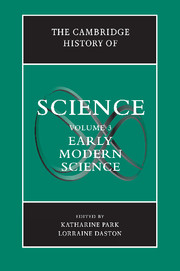Book contents
- Frontmatter
- 1 Introduction: The Age of the New
- Part I The New Nature
- 2 Physics and Foundations
- 3 Scientific Explanation from Formal Causes to Laws of Nature
- 4 The Meanings of Experience
- 5 Proof and Persuasion
- Part II Personae and Sites of Natural Knowledge
- Part III Dividing the Study of Nature
- Part IV Cultural Meanings of Natural Knowledge
- Index
- References
2 - Physics and Foundations
from Part I - The New Nature
Published online by Cambridge University Press: 28 March 2008
- Frontmatter
- 1 Introduction: The Age of the New
- Part I The New Nature
- 2 Physics and Foundations
- 3 Scientific Explanation from Formal Causes to Laws of Nature
- 4 The Meanings of Experience
- 5 Proof and Persuasion
- Part II Personae and Sites of Natural Knowledge
- Part III Dividing the Study of Nature
- Part IV Cultural Meanings of Natural Knowledge
- Index
- References
Summary
In our times, the domain of the physical sciences is reasonably well defined. Although, at its edges, the less empirically grounded parts of the physical sciences may merge into philosophical speculation, it is no compliment to a scientist to characterize his or her work as “philosophical.” In this respect, we have moved a considerable distance from the early modern period. For many European thinkers in the sixteenth and seventeenth centuries, an account of the world around them was radically incomplete without a larger background picture in which to embed it, a picture that often included elements such as the basic categories of existence and the relation of the natural world to God. Many shared the sense of the interconnectedness of knowledge and felt the need for what might be called a foundation for the science that treats the natural world.
The project did not have precise boundaries, nor is it easy to characterize what it is that we are talking about when we are talking about the foundations of our understanding of the physical world. In many ways, the enterprise of providing foundations for a view of the physical sciences was shaped by two traditions, the Aristotelian tradition in philosophy and the Christian tradition in theology. As I shall argue in more detail, the Aristotelian tradition was a common element in the intellectual background of every serious thinker of the period and provided a model for what a properly grounded science should look like. Even for many of those who would reject the Aristotelian tradition in favor of other ancient traditions (such as atomism or Hermeticism) or other views of the world not obviously connected with ancient philosophical traditions, the Aristotelian tradition was hard to escape.
- Type
- Chapter
- Information
- The Cambridge History of Science , pp. 19 - 69Publisher: Cambridge University PressPrint publication year: 2006
References
- 9
- Cited by



